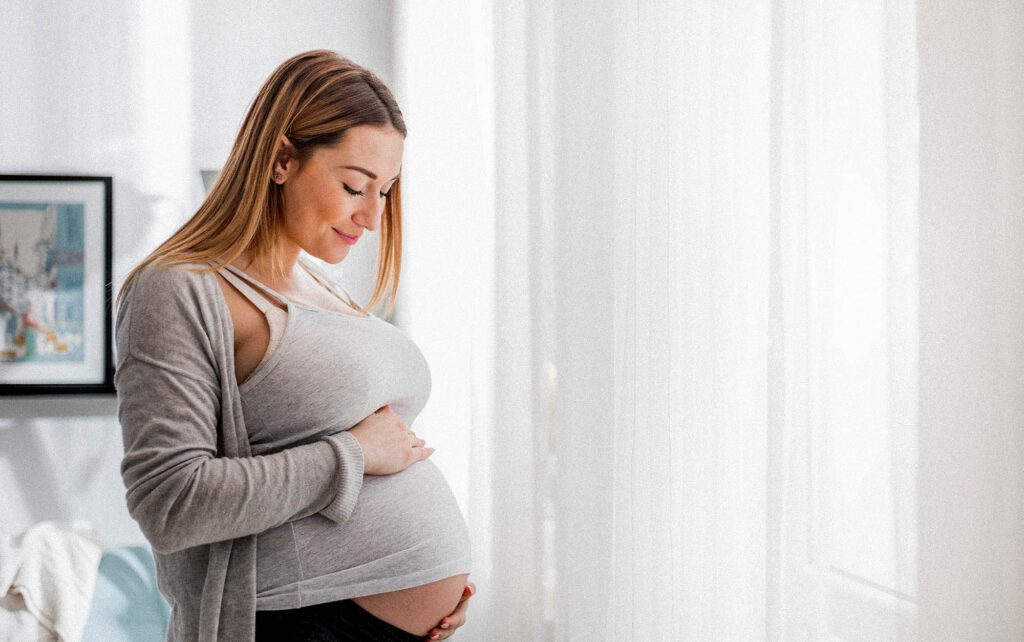Information center / Gynecology / Maternity / Monthly Spotlight / Reproduction / VM Med / Women's health
Are You Pregnant –Or Not? Early Symptoms of Pregnancy

(Tina Dawn/ VM-Med) — No two people are alike, so not everyone experiences the same early symptoms of a pregnancy. Some women may notice they’re pregnant almost immediately after conception. Some may not realize until months later. While you still need to take a pregnancy test or an ultrasound to confirm a pregnancy, there are several tell-tale early indicators with which your body will often let you know you may have conceived.
Early Signs of Pregnancy
Among the more obvious early signs you may be pregnant:
- Missed period
- Tender and/or swollen breasts
- Mood swings
- Mild cramping
- Fatigue
- Nausea
- A frequent need to urinate
- A feeling of bloating
- Heartburn
A missed period is the most obvious sign. Once conception has happened, your body will begin producing hormones that stop ovulation and the shedding of the lining of your uterus. That means you will not get another period until after you have given birth. That doesn’t mean, however, that a missed period is an immediate sign of pregnancy. Women miss periods all the time if they’re excessively stressed or if they experience hormonal imbalances. Extreme dieting or too much exercise can also cause some women to miss a menstrual cycle.
Many women who are pregnant will experience some spotting around the time when they should have gotten their period. This does not occur with everyone. This spotting appears as a light period with very light bleeding or simple spotting and occasional cramping.
If a missed period incites you to get a pregnancy test to confirm what you may suspect, it’s important to keep in mind that it’s very likely that you may also get a false negative. If you suspect you may be pregnant you are better off going to see your doctor for an ultrasound to confirm conception. The earlier you know the better you can prepare, contemplate all your options, and ensure yours and the baby’s health with prenatal care. While you can take a pregnancy test as soon as you’ve missed your period, it’s preferable to wait at least one week after to get the most accurate results.
Usual and Common Signs of Pregnancy

Many of the usual symptoms ands early signs of pregnancy are also:
- Fatigue during pregnancy. This is something many women complain about. They lack energy and constantly feel sleepy, especially in the first few months. This occurs because of high levels of the hormone progesterone. The best strategy is to ensure you get enough quality sleep. Keeping your bedroom nice and cool helps. Fatigue usually dissipates during the second trimester but often returns for the third and final one.
- A higher core temperature. Pregnant women often complain of being too hot or uncomfortable, especially in hot weather or while exercising too strenuously. It’s important that pregnant women hydrate, stay out of the sun, and pay close attention to their basal body temperature.
- Tender and swollen breasts. Women in the early stages of their pregnancy will immediately notice changes to their breasts. They routinely become swollen and far more sensitive. As the pregnancy progresses, they will also start to notice changes in their nipples, and the areola around the nipple will usually become much darker. Women who experience excess sensitivity with their breasts can alleviate some of these symptoms by changing to more comfortable and supportive bras and using breast pads that protect and shield nipples from friction.
- Morning sickness is a common symptom of pregnancy. And despite its name, women can experience it at any time of day, not just in the morning. Not all women experience nausea, but it’s quite a typical symptom early in a pregnancy. Be on the lookout for extreme nausea and the inability to keep food and liquids down. That could be a sign of a much more serious condition, hyperemesis gravidarum, which can cause weight loss, dehydration and often requires hospital treatment.
- Changes in mood. As hormones change, it’s normal for pregnant women to experience mood swings. Depression, irritation, anxiety are just some emotions that can just as easily be replaced with feelings of elation and excitement over the pregnancy. Be prepared for a wide variety of feelings as your body changes and prepares for a big change and you psychologically and mentally prepare to welcome a new addition to your life.
- Frequent urination and occasional incontinence. These are also common early signs of pregnancy. Pregnant women experience an urge to pee more because their body’s blood supply increases. The more blood in your body, the more your kidneys work to filter it, and the more frequently you must go to the bathroom to remove the extra waste via your pee.
- Food aversions. A very common symptom of pregnancy is when you become more sensitive to certain smells and tastes and suddenly you can’t stand food that you once loved or vice versa.
Less Common Signs of Early Pregnancy
Some women experience signs of early pregnancy that are less common. Again, these symptoms vary person by person and some women may never experience them at all.
- Spotting and light bleeding. While it may alarm some women, spotting and light bleeding early in the pregnancy is perfectly normal and doesn’t necessarily indicate that something is wrong.
- Metallic taste in the mouth. Some women experience a strange sign early on in their pregnancy where they feel like they have coins in their mouths or they’re sipping from a metal cup when they’re eating certain foods. The medical term for your taste buds acting strange is called dysgeusia and it’s caused by hormonal changes. It’s quite common in the first trimester.
- Headaches, cramping, acne and skin changes, and congestion are also all common symptoms during the first few months of pregnancy as hormonal changes take place. They are nothing to worry about. However, if you experience severe cramping, you should consult your doctor because it could be a sign of an ectopic pregnancy or other complication.
Regardless of how many signs are telling you that you have conceived, the only way you can know for sure is by seeing your healthcare provider. The sooner your pregnancy is confirmed, the sooner you can start taking prenatal vitamins and prepare for the birth.
VM Med Clinic’s Gynecology Centre supports every aspect of our patients’ gynecological health throughout the course of their lives. Physicians at the gynecology clinic follow patients from the start of their pregnancy to about their third trimester and will routinely recommend a variety of first and second-trimester prenatal screenings, tests and imaging techniques for their peace of mind.
For more information, you can read our extensive archive of VM-Med maternity blogs which cover subjects of interest before, during and after the pregnancy.
Still have questions? Book a consultation with our experts.
Categories
